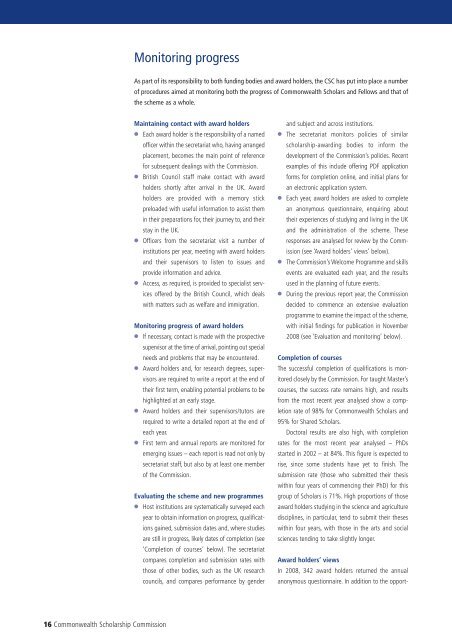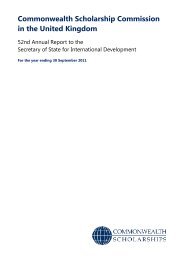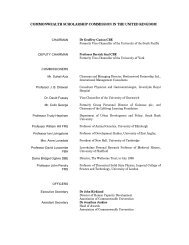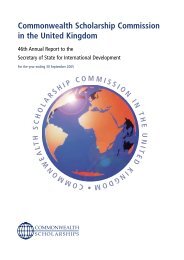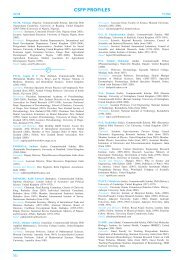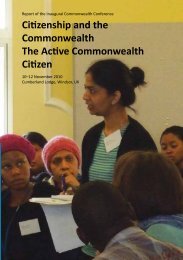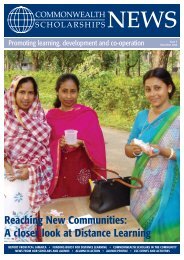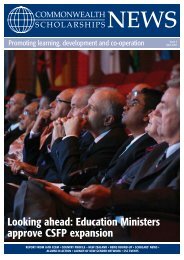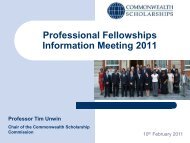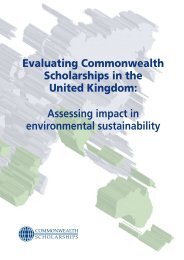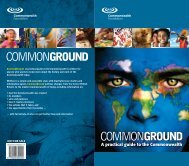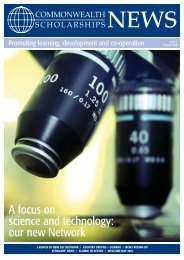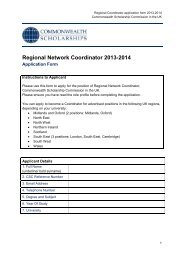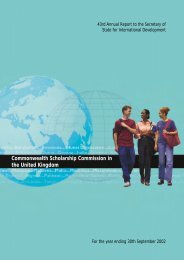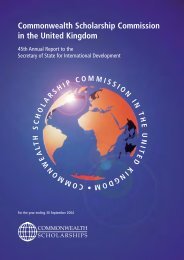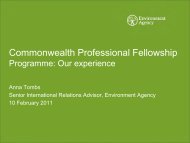49th Annual Report (2007-2008) - Commonwealth Scholarship ...
49th Annual Report (2007-2008) - Commonwealth Scholarship ...
49th Annual Report (2007-2008) - Commonwealth Scholarship ...
Create successful ePaper yourself
Turn your PDF publications into a flip-book with our unique Google optimized e-Paper software.
Monitoring progress<br />
As part of its responsibility to both funding bodies and award holders, the CSC has put into place a number<br />
of procedures aimed at monitoring both the progress of <strong>Commonwealth</strong> Scholars and Fellows and that of<br />
the scheme as a whole.<br />
Maintaining contact with award holders<br />
● Each award holder is the responsibility of a named<br />
officer within the secretariat who, having arr anged<br />
placement, becomes the main point of reference<br />
for subsequent dealings with the Commission.<br />
● British Council staff make contact with award<br />
holders shortly after arrival in the UK. Award<br />
holders are provided with a memory stick<br />
preloaded with useful information to assist them<br />
in their preparations for, their journey to, and their<br />
stay in the UK.<br />
● Officers from the secretariat visit a number of<br />
institutions per year, meeting with award holders<br />
and their supervisors to listen to issues and<br />
provide information and advice.<br />
● Access, as required, is provided to specialist serv -<br />
ices offered by the British Council, which deals<br />
with matters such as welfare and immigration.<br />
Monitoring progress of award holders<br />
● If necessary, contact is made with the prospective<br />
supervisor at the time of arrival, pointing out special<br />
needs and problems that may be enc ountered.<br />
● Award holders and, for research degrees, super -<br />
visors are required to write a report at the end of<br />
their first term, enabling potential problems to be<br />
highlighted at an early stage.<br />
● Award holders and their supervisors/tutors are<br />
required to write a detailed report at the end of<br />
each year.<br />
● First term and annual reports are monitored for<br />
emerging issues – each report is read not only by<br />
secretariat staff, but also by at least one member<br />
of the Commission.<br />
Evaluating the scheme and new programmes<br />
● Host institutions are systematically surveyed each<br />
year to obtain information on progress, qualific at -<br />
ions gained, submission dates and, where studies<br />
are still in progress, likely dates of completion (see<br />
‘Completion of courses’ below). The secret ariat<br />
compares completion and submission rates with<br />
those of other bodies, such as the UK research<br />
councils, and compares performance by gender<br />
and subject and across institutions.<br />
● The secretariat monitors policies of similar<br />
scholarship-awarding bodies to inform the<br />
development of the Commission’s policies. Recent<br />
examples of this include offering PDF application<br />
forms for completion online, and initial plans for<br />
an electronic application system.<br />
● Each year, award holders are asked to complete<br />
an anonymous questionnaire, enquiring about<br />
their experiences of studying and living in the UK<br />
and the administration of the scheme. These<br />
responses are analysed for review by the Comm -<br />
ission (see ‘Award holders’ views’ below).<br />
● The Commission’s Welcome Programme and skills<br />
events are evaluated each year, and the results<br />
used in the planning of future events.<br />
● During the previous report year, the Commission<br />
decided to commence an extensive evaluation<br />
programme to examine the impact of the scheme,<br />
with initial findings for publication in November<br />
<strong>2008</strong> (see ‘Evaluation and monitoring’ below).<br />
Completion of courses<br />
The successful completion of qualifications is mon -<br />
itored closely by the Commission. For taught Master’s<br />
courses, the success rate remains high, and results<br />
from the most recent year analysed show a comp -<br />
letion rate of 98% for <strong>Commonwealth</strong> Scholars and<br />
95% for Shared Scholars.<br />
Doctoral results are also high, with completion<br />
rates for the most recent year analysed – PhDs<br />
started in 2002 – at 84%. This figure is expected to<br />
rise, since some students have yet to finish. The<br />
submission rate (those who submitted their thesis<br />
within four years of commencing their PhD) for this<br />
group of Scholars is 71%. High proportions of those<br />
award holders studying in the science and agriculture<br />
disciplines, in particular, tend to submit their theses<br />
within four years, with those in the arts and social<br />
sciences tending to take slightly longer.<br />
Award holders’ views<br />
In <strong>2008</strong>, 342 award holders returned the annual<br />
anonymous questionnaire. In addition to the opport -<br />
16 <strong>Commonwealth</strong> <strong>Scholarship</strong> Commission


